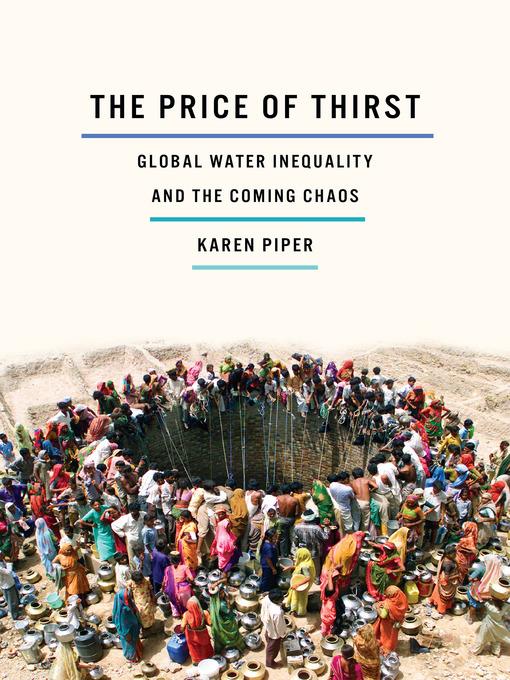
The Price of Thirst
Global Water Inequality and the Coming Chaos
کتاب های مرتبط
- اطلاعات
- نقد و بررسی
- دیدگاه کاربران
نقد و بررسی

October 1, 2014
Samuel Taylor Coleridge once wrote that "Water, water everywhere, nor any drop to drink." This poetic line could become a global chant if water inequality continues, as Piper (postcolonial studies, Univ. of Missouri; Cartographic Fictions; Left in the Dust) explains in her latest work. The author presents an alarming account of the state of water on a global scale by traveling to six continents and a dozen countries to investigate what happens to vast populations when water is treated as a commodity, not a human right. Countries such as Chile and South Africa, as well as the city of New Delhi, have become battlegrounds for water rights after privatization has left impoverished communities with either dry taps or flooded villages. Piper further explores how historical colonization has encouraged water to be treated as an economic commodity on indigenous lands. She studies the World Bank, the International Monetary Fund, and G-20 policies in relation to water inequality for a fifth of the world's population and concludes that communities should focus on giving power back to the people, not to corporations. VERDICT Essential for the reader interested in global poverty and human rights and those who enjoyed Thomas Nazario's Living on a Dollar a Day.--Angela Forret, Clive P.L., IA
Copyright 2014 Library Journal, LLC Used with permission.

August 1, 2014
Piper (English and Geography/Univ. of Missouri; Left in the Dust: How Race and Politics Created a Human and Environmental Tragedy in L.A., 2006, etc.) introduces us to a brave new world in which drought is a prime business opportunity. The gradual diminishment of clean fresh water is not late-breaking news, but the scarfing up of what remains by private concerns is fast approaching a maybe-too-late moment, writes the author in this piece of tack-sharp reportage. Piper outlines a scenario in which "a small number of multinational corporations are banking on the fact that the world is entering a global water crisis....And now they are mining our water, quietly gaining control over our water supplies, with the help of national governments and institutions like the World Bank and the International Monetary Fund." Lest readers feel that the author is being hyperbolic, she provides firsthand evidence and plenty of footnotes to back up even the most minor act of water pilfering. Piper diligently charts the gathering of fresh water into fewer and fewer hands, providing such examples as massive drought in California, the damming and diverting of the Ganges River in India, the corruptions and snafus of post-Mubarak Egypt and post-Apartheid South Africa, the draining of fossil water and the overextraction of other once-replenishable water sources, and the classic arm-twisting of the IMF, which withheld American relief money to South Africa unless they kept wages stagnant, removed trade barriers and cut government services. The author also offers a handful of immediate actions that can be taken (including recognition and revival of indigenous water-knowledge systems) and ends on a somewhat positive note: "public pushback against water privatization has worked and companies are now in retreat"-but this story has many chapters to go. Piper's report makes for anxious yet informative reading.
COPYRIGHT(2014) Kirkus Reviews, ALL RIGHTS RESERVED.

























دیدگاه کاربران